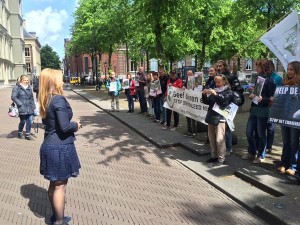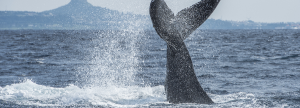Worldlog Tjedan 22 – 2015
U Nizozemskoj nažalost još uvijek postoje okrutni “hobiji” zbog kojih životinje moraju strašno da pate. Primjer je lov na labudove. Tu se radi o vrlo okrutnoj operaciji, pri kojoj se najprije iz prirode hvataju labudovi, a zatim im se ukloni dio krila, tako da labudovi više ne mogu letjeti. Lovci na labudove zarađuju puno novca prodajom labudova kao ukrasne ptice. Naša stranka se već godinama bori protiv lova na labudove i traži da se zaustavi ovaj lov. Državna tajnica je tek nakon emitiranja Nizozemske televizijske emisije “EenVandaag”, koja je bila posvećena lovu na labudove, obećala da će zaustaviti lov. Prošlog tjedna je jedna grupa došla u parlament u Haagu da organizuje prosvjed protiv lova na labudove. Cilj tog prosvjeda je bio dati do znanja državnoj tajnici da je zabrana lova na labudove jako potrebna. Za svakog tko je bio prisutan na ovoj akciji: hvala vam još jednom!
Na trgu ispred parlamenta u Haagu
Već od 80-ih godina postoji međunarodni sporazum za zabranu lova na kitove. Nekoliko zemalja, uključujući Island, Norveška i Japan, zaista krše ovaj sporazum. Mnogi su kitovi ugroženi, a ako se ova situacija nastavi oni će izumrijeti. Trenutno se vrše pregovori između Europe i Japana o sporazumu za trgovinu koji Japan želi s Europom. Našoj stranci se to čini dobra prilika da se kroz trgovinsku politiku, zajedno sa Europskim parlamentom, vrši pritisak na Japanu. Pregovore bi trebalo zaustaviti, sve dok Japan ne zaustavi ilegalan kitolov. Naš poziv za takve mjere je ovog tjedna na svu sreću dobio i podršku iz drugih političkih skupina u Europskom parlamentu.
Lobisti za kemijsku industriju su na sve moguće načine blokirali i odgađavali akciju Europske unije protiv upotrebe tvari koje narušavaju djelovanje hormona. To pokaziva skupina za istraživanja i kampanje, Corporate Europe Observatory (CEO). Lobisiti kemijske industrije su to na primjer činili manipulacijom znanstvenih dokaza. Radi se o moguće otrovnim kemikalijama u proizvodima kao što su pesticidi, plastike, kozmetike, računala, tepisi i građevinski materijal. Te tvari mogu poremetiti djelovanje hormona i posebno su opasni za djecu i trudnice. Te tvari su dakle vezan za, između ostalog, rak, neplodnost, dijabetes i pretilost. Odjel za okoliš Europske komisije su ozbiljno ometale kolege iz odjela koje se bave trgovinom i poslovanjem. Mislim da je sramotno da se zbog toga zakonodavstvo već godinama odgođa. Naše zdravlje treba biti na prvom mjestu! U raspravi o međunarodnoj trgovini pozvala sam pažnju na moć lobista iz multinacionalnih tvrtki. Kliknite ovdje.
Za kraj vam preporučujem nešto za čitanje. Prvo ovaj prekrasan članak o vrijednosti naše prirode. Drugo bih preporučila knjigu “Redefining Prosperity” “. Ova knjiga opisuje to što mi kao jedina stranka u Nizozemskoj govorimo: ekonomski rast na planeti s ograničenim resursima nije rješenje krize, već upravo dio problema.
Ugodno čitanje i do sljedećeg tjedna!
Pozdrav, Marianne
In the Netherlands, there are unfortunately still cruel ‘hobbies’ that cause a lot of harm to animals. An example of this is swan drifting. Swan drifting is an extremely cruel procedure whereby swans are first caught in the wild, after which a part of their wings is removed, so the animals can no longer fly away. Swan drifters make a lot of money by subsequently selling the swans as ornamental birds. For many years, our party has pleaded for a total ban on swan drifting. Not until a television broadcast about this, the State Secretary recently promised to withdraw the last exemptions. A protest group came to the Lower House in The Hague last week to campaign against swan drifting. The aim of the campaign was to urge the State Secretary that it is extremely necessary to withdraw the exemptions of the swan drifters that are currently still active. For everyone who participated in this campaign: thank you again!
On Plein in front of the Lower House in The Hague
Since the 1980s already, it was internationally agreed not to hunt whales. A few countries, however, including Iceland, Norway and Japan, are not bothered about this agreement. Many whales are threatened and they will become extinct if this continues. Negotiations between Europe and Japan are currently ongoing with respect to a trade agreement that Japan wants with Europe. To our party, this seems to be a good opportunity to have the European Parliament exert pressure on Japan through commercial policy. The negotiations ought to be stopped as long as Japan does not stop illegal whaling. Our call for this was fortunately also supported by other political groups in the European Parliament this week.
Lobbyists for the chemical industry have managed to block and delay action by the European Union against the use of hormone disrupting substances in many ways. This was said by the research and campaign group Corporate Europe Observatory (CEO).
Last week, it became clear that lobbyists for the chemical industry have managed to block and delay EU measures against the use of hormone disrupting substances in many ways. They did this by, for example, manipulating scientific evidence. This involves possibly toxic chemicals in products such as pesticides, plastics, cosmetics, computers, carpets and building materials. Those substances may be hormone disruptive and are particularly dangerous to children and pregnant women. The substances have therefore been linked to, inter alia, cancer, infertility, diabetes and obesity. Allegedly, the environment department of the European Commission was seriously thwarted by colleagues of departments involved in trade and business. I find it outrageous that this has caused years of delays in legislation already. Our health should come first! In the debate about international trade, I called attention to the power of lobbyists from multinationals. Click here.
To conclude, I have two reading tips for you! Firstly, this wonderful article on the value of our nature. Secondly, I would like to recommend the book “Redefining Prosperity”. The book describes what we have been pointing out as the only party in the Netherlands: On a planet with limited resources, economic growth is no solution to the crises, but precisely the problem.
Enjoy your reads and see you next week!
Regards, Marianne


